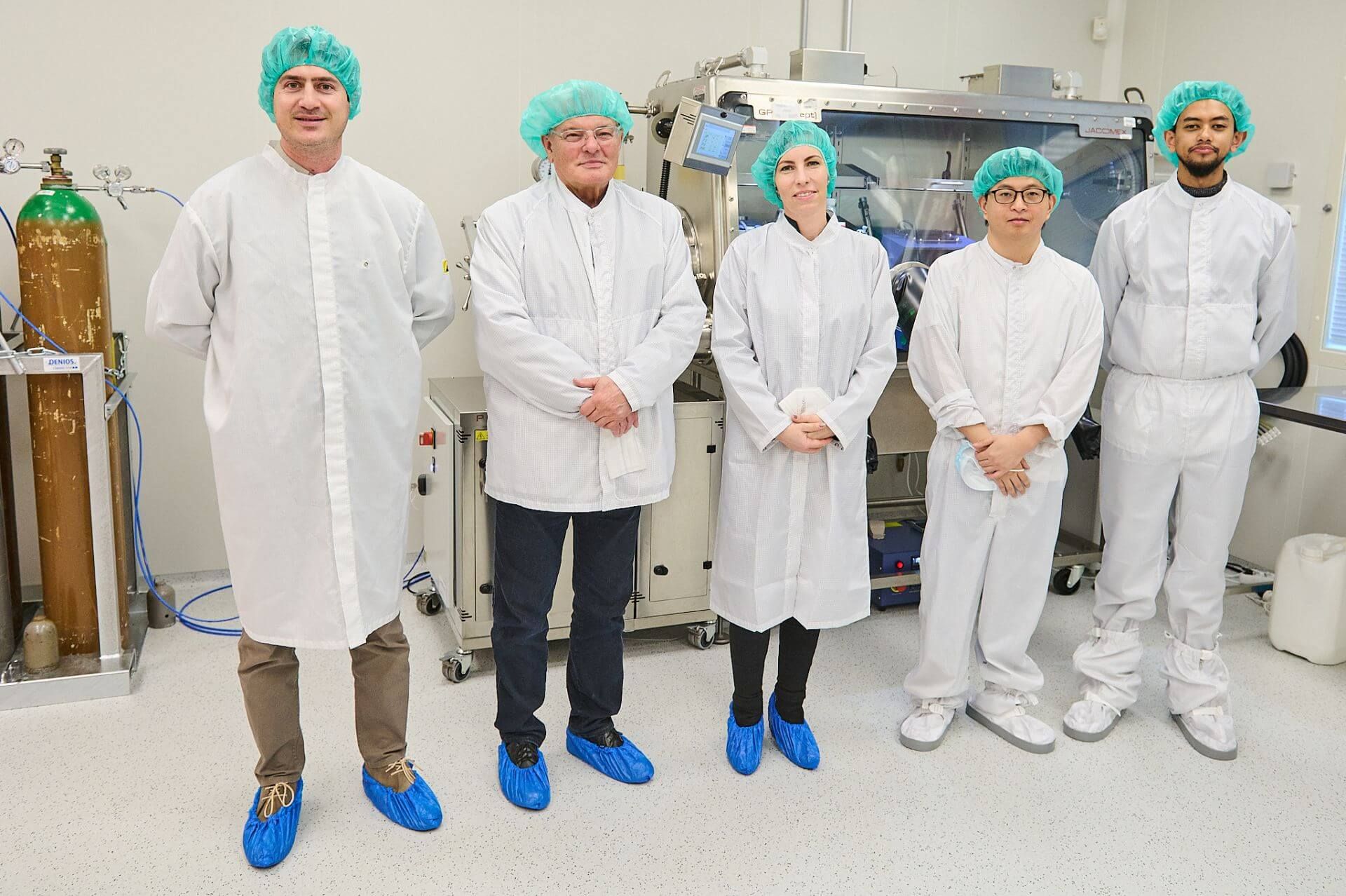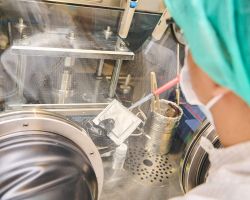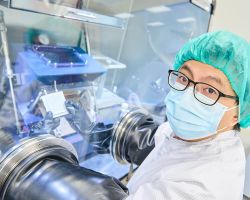The university in Zlín has launched prototype production of batteries
Zlín, 8 December 2021 – Tomas Bata University (TBU) in Zlín today launched a prototype battery production line. The line has been developed as part of the Theta Programme’s project entitled Next Generation of All-Solid-State Li-ion Batteries, which is supported by the Technology Agency of the Czech Republic (TACR). (TK03030157)
“Few people can imagine life without electricity. To have it available at all times, we have to keep taking it from the grid. A more efficient option is to store and consume the electricity generated at the time or place where it is needed. Energy storage equipment serves this purpose, which in our case involves lithium-ion batteries, a promising solution preferred in the future of Czech energy sector,” says Professor Petr Sáha, Vice-Rector for Science and Research at TBU, adding: “The research and development of new battery types feature a very high momentum, with thousands of research institutions around the world trying to find more novel energy storage solutions every day.”
Several major milestones are to be achieved during the project; they include the commissioning of the line today. “The next important step will be preparing the individual battery parts on the new line. Specifically, this involves the preparation of electrodes with very good electrochemical stability and high energy density. In parallel, a temperature-stable, solid-state electrolyte is also being developed, which must guarantee the safety of the battery. All parts must then be designed to allow scale-up, i.e. expansion for future mass production,” says Professor Petr Sáha, who is also the head of the Energy and Composite Materials Group at the Centre for Polymer Systems.
Operating conditions are one of the prerequisites for the work of the prototype battery line to be successful. Clean rooms are required here; such premises (certified) exist inside the U11 building of the University Institute.
“This is where we managed to place the line in self-contained clean rooms. The premises are used already today for medical materials research, so we can build on the positive experience with their operation,” said Tomáš Sáha, who is responsible for the clean rooms at the University Institute.
For the preparation of the prototype batteries to start, the raw materials for the cathode, anode and electrolyte must first be prepared. This is followed by the processing of the prepared materials on the line, which now consists of 8 pieces of equipment connected to each other.
“Basically, these are processes that can be defined as cassette container forming, ultrasonic welding of container parts, stacking of electrode layers, electrode die-cutting, roll forming, hot stacking, vacuum drying and assembly of the cassette battery under vacuum. This prototype battery is ready for testing, which involves about 20 parameters,” says Haojie Fei, a member of the research staff, describing the battery manufacturing process.
The history of energy materials research in Zlín is relatively long. It began at the Faculty of Technology (FT) in the 1990s when the Centre for Polymer Materials – the forerunner of the current Centre for Polymer Systems – investigated the effect of electric and magnetic fields on the behaviour of polymers. The evolution of research on polymers for energy was subsequently furthered at the Centre for Polymer Systems (CPS), where a research group was established to focus on energy and composite materials/technologies. “The current team includes 25 researchers, the vast majority of whom are persons from abroad. As part of this group, the Joint EU-China Laboratory for Energy Materials and Equipment Research was set up within the partnership between TBU and East China University of Science and Technology in Shanghai as a result of many years of successful cooperation,” adds Project Manager Viera Pechancová.
The new line will be used for a variety of projects. Of these, the Horizon 2020 StoRIES project, which addresses the infrastructural interconnection of European energy research institutions, is of particular importance. In total, 64 research infrastructures from 17 countries are involved here in collaborating on research into future energy storage.
For other activities, there is a collaboration project with the EASE Association to develop a hybrid supercapacitor, a device that allows extremely fast energy intake and very fast energy output. The Zlín University cooperates here with more than 60 European research institutions, which can use the line as needed.
“LiBASED is also a major project; it brings together TBU, the Slovak Academy of Sciences and Sanbaci University, Istanbul, to address hybrid energy storage. The essence of the project is to exploit the advantageous properties of batteries and capacitors, which, through structural interconnection, can offer lightweight mobile energy storage units,” adds Viera Pechancová.
The research team is also working on other subjects in energy, among which the upcoming projects on socio-economic aspects of energy storage and green batteries are particularly appreciated. “This type of battery is made from materials that will not harm the environment at the end of their life. We are now exploring the possibility of using natural polymers such as chitosan, which is proving to be a good choice for the future,” says TBU’s Spokesperson Petra Svěráková.
The upcoming cooperation topics are also interesting. Footwear Research Centre is the partner for studying the use of waste chrome-tanned leather for the preparation of energy materials. With Slovak colleagues, prototypes of new electrochemical sensor electrodes that can detect insulin and glucose quickly and accurately are being developed. This can be good news for diabetic patients.




